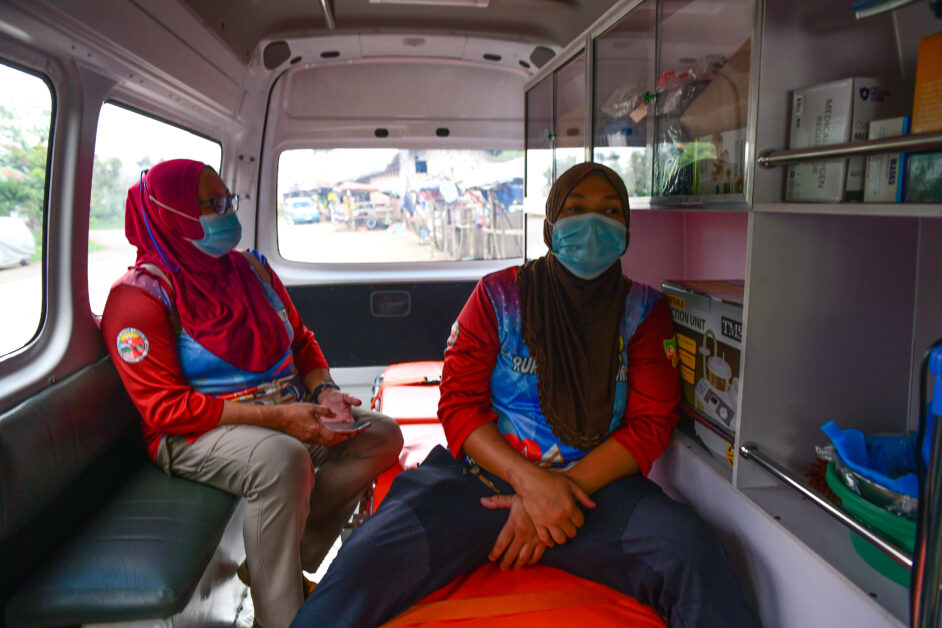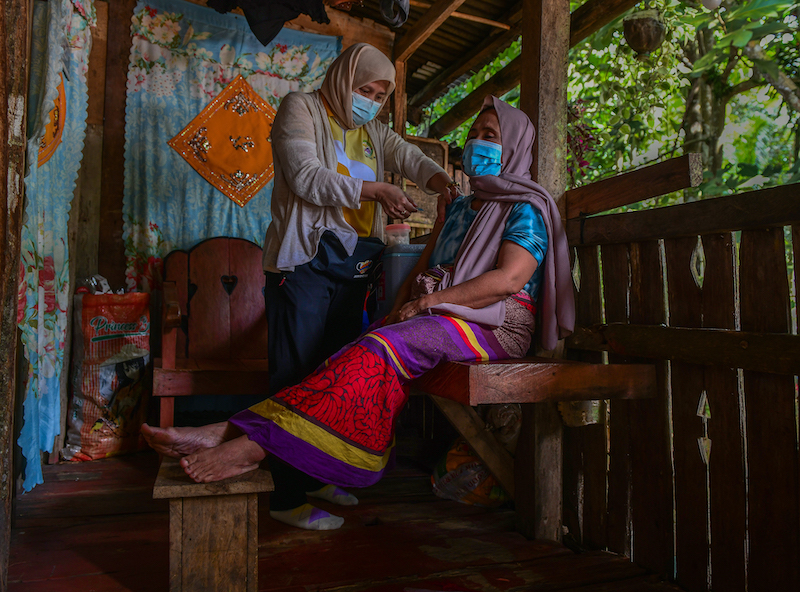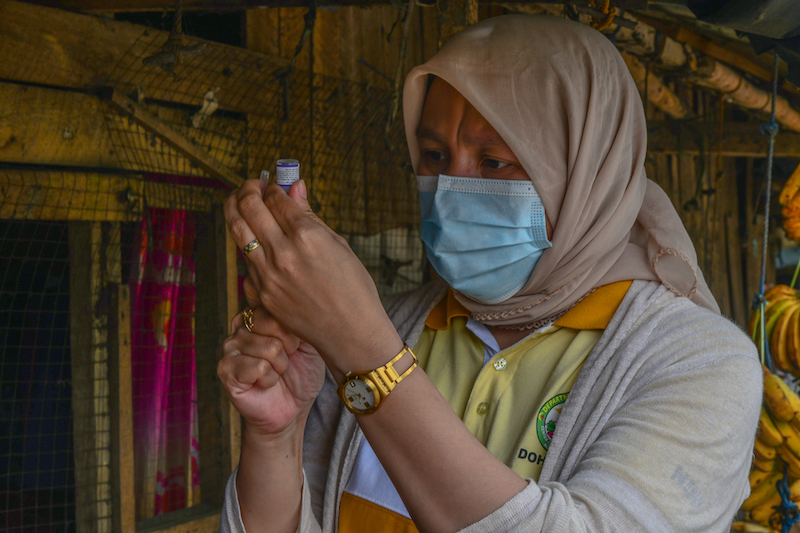PANTAR, Lanao del Norte (MindaNews / 25 March) — Carrying bags of COVID-19 vaccines, Hairan Dimosimba Campong and her team of 12 nurses squeeze into the white Nissan ambulance that would bring them to the outlying villages in this town.
The ambulance driver would stop in every village he passed and two or three nurses would get off until the vehicle reaches Barangay West Pantar.
Campong and two others leave the ambulance lugging a bag containing the COVID-19 vaccines, instructing the driver to wait for them at the highway, then hike up the mountain through a muddy trail.
“Every day since January, we have been doing this. Rain or shine,” Campong said.
 Nurses board an ambulance loaded with COVID-19 vaccines en route to last mile villages in Pantar, Lanao del Norte on Feb. 2, 2023. MindaNews photo by FROILAN GALLARDO
Nurses board an ambulance loaded with COVID-19 vaccines en route to last mile villages in Pantar, Lanao del Norte on Feb. 2, 2023. MindaNews photo by FROILAN GALLARDO
Dr. Hapsa Salic Batuan, head of the Pantar town Rural Health Unit said Campong and the nurses started their house-to-house campaign since January this year.
Vaccination hesitancy, however, has remained a problem.
Campong and her team of four nurses and interns visit houses in the hinterland village of Upper Pantar but each time received negative responses.
Some would hide inside their houses upon seeing the nurses with the unmistakable shoulder bag of COVID-19 vaccines.
Others would feign sickness or tell the nurses that they are not ready to receive the jab.
“These are their usual excuses when our team visits their houses. Many of them are afraid that they would get sick,” she said.
Campong said it is understandable since a day in bed would mean they cannot work and could provide no food on the table.
She said most residents here live on “a hand to mouth” existence, barely earning from the farmland on the slopes of Pantar, a fifth-class municipality beside the Agus River in Lanao del Norte province.
Most of Pantar’s 26,599 residents are farmers who sell their produce in nearby Marawi City or at the roadside stalls that dot the highway.
The Department of Health region 10 has targeted 16,489 residents in the municipality of Pantar, Lanao del Norte for vaccination.
 A nurse administers booster shot against COVID-19 in the house of the vaccinee in a rural village in Pantar town, Lanao del Norte on February 2, 2023. MindaNews photo by FROILAN GALLARDO
A nurse administers booster shot against COVID-19 in the house of the vaccinee in a rural village in Pantar town, Lanao del Norte on February 2, 2023. MindaNews photo by FROILAN GALLARDO
In its March 12, 2023 assessment, the DOH 10 said only 5,568 residents had been given their first dose of vaccine and only 4,914 residents got their second dose.
For the first booster shot, the DOH 10 said only 1,141 residents took the jab while only 271 did for the second booster.
The DOH 10 said some 10,921 residents remain unvaccinated, making Pantar municipality among the highest in Lanao del Norte province in terms of vaccine hesitancy.
Despite the difficulties, Campong and her team continued visiting more houses in Barangay West Pantar, braving muddy trail and rains, until they came upon the house of 57-year old Fatimah.
Fatimah readily agreed to be inoculated. She told them she was waiting for weeks for the nurses to pass by.
 A nurse prepares a COVID-19 vaccine booster shot in Pantar town, Lanao del Norte. MindaNews photo by FROILAN GALLARDO
A nurse prepares a COVID-19 vaccine booster shot in Pantar town, Lanao del Norte. MindaNews photo by FROILAN GALLARDO
“I am not scared of being vaccinated. I do not listen to my neighbors telling unfounded stories about the COVID-19 vaccine,” Fatimah told the team as she showed them her vaccination card, proof that she had already been inoculated twice.
Fatimah said this was her first booster shot.
Campong’s second luck came as the weary team returned to the highway. A woman went up to them showing her vaccination card and asking for a second shot.
“We are lucky today. We have two vaccinations but on other days, we came up with zero,” Campong said.
The other team of nurses who went farther down the highway came back with zero results.
Batuan sad the spread of disinformation on the COVID-19 vaccines made more people hesitate against vaccination.
“At the onset of the pandemic, news and commentary programs were airing fake news about the vaccine. These stuck on the minds of the listeners,” the doctor told MindaNews.
Batuan said the DOH tried many ways to counter the wrong information but the misconceptions about the vaccines continued.
She said Muslim religious leaders like the Imams joined them in the campaign to convince fellow Muslims to accept vaccination because it is not “haram” (forbidden) but necessary to keep them safe.
“I think the hesitancy is not religious but more cultural. Fake news about the vaccination program was so pervasive that it stayed in the minds of the residents,” Batuan said.
Batuan said another reason for hesitancy among the residents was when health authorities eased the COVID-19 restrictions that allowed residents to move around after two years of strict quarantine measures.
She said the requirement to present vaccination cards when entering shopping malls and entering nearby Iligan City was lifted as COVID-19 cases fell nationwide.
Batuan lamented that the unvaccinated became even bolder in shunning vaccination against COVID-19. (Froilan Gallardo / MindaNews)
